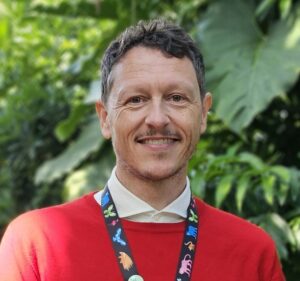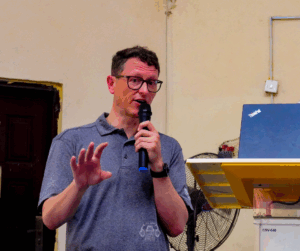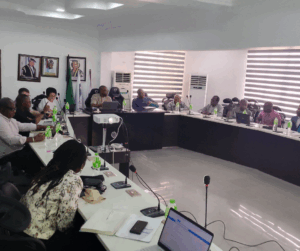Conservation Connections: Reflections from Nigeria
August 28, 2025
 This month, we caught up with Dr. Andrew MacIntosh, Senior Scientist, Wildlife Conservation at the Wilder Institute, following his recent trip to Nigeria.
This month, we caught up with Dr. Andrew MacIntosh, Senior Scientist, Wildlife Conservation at the Wilder Institute, following his recent trip to Nigeria.
For the past few years, the Wilder Institute has partnered with the Nigerian Conservation Foundation (NCF) to support graduate students at the University of Calabar (UniCal) through scholarships and study programs focused on Cross River gorilla conservation.
While in Nigeria, Dr. MacIntosh attended a Program Advisory Committee (PAC) meeting — a group that provides guidance and logistical support to these students. The PAC brings together representatives from the Wilder Institute, NCF, and UniCal, along with the local forestry commission, national parks, and community associations where fieldwork takes place.
In this Q&A, Dr. MacIntosh reflects on his visit and offers a glimpse into the collaborative efforts underway to protect the Cross River gorilla.
Question: Were there any moments that really stood out to you on your trip—professionally or personally?
“From the moment I joined the program midway through, I was welcomed so warmly by the students and partners. That sense of belonging really stood out to me and set the tone for the trip.
One moment that stood out to me really speaks to how lively UniCal is — I was invited to present some of my previous work on primate infectious disease ecology and conservation, and the event was attended by well over a hundred people. The questions I received afterward were astute and diverse, and it was just a great opportunity to taste that curiosity and engage in meaningful exchanges with the audience.
Our team also hosted a two-day workshop on gender-inclusive research, co-facilitated by Dr. Mary Liao from the Wilder Institute and Dr. Blessing Ntamu, Senior Lecturer in Psychology and Head of External Relations at UniCal. Built around the United Nation’s Open Online Course on Gender and Environment, the workshop offered students in our program — as well as others at UniCal with an interest in the topic — the chance to explore linkages between gender and conservation and to learn how to incorporate gender-responsive methods into their own research.
This session was eye-opening, and I was privileged to observe how openly and honestly participants approached the subject matter and expressed their desire to implement equitable research and conservation practices.”
Question: What are some of the challenges or opportunities you observed during your time there?
“The Cross River gorilla is the most critically-endangered great ape on the planet — fewer than 300 individuals left in the wild, and the population is really fragmented by ongoing activities like agriculture, livestock production and logging. At local scales, people often need the resources provided by the forests and don’t always have economic incentives or even the capacity to use those resources sustainably.
Having passionate and dedicated students in our program investigating the very things that lead to conflicts over resources and being a part of those communities and their efforts to move toward more sustainable practices is exactly what this program is trying to achieve.”
Question: Collaboration is vital in this program. What was it like working alongside local communities and conservation partners in the region?

Dr. Andrew MacIntosh answers questions about primate disease ecology and conservation at the University of Calabar.
“Right from the start, having chosen the Nigerian Conservation Foundation as our key partner in the country was a sign that we were committed to work with Nigerian-led organization. I didn’t get a chance to visit any local communities, but having a representative from there on our advisory committee has been fantastic, and getting a student from one such community is even better.
And as an academic at heart, it was wonderful spending time at the University of Calabar, meeting students, hearing their ideas, talking about Nigerian flora and fauna and the social contexts that surround them.”
Question: Finally, is there anything you’d like people to know about the Cross River Gorilla Initiative that they might not realize?

Meeting of the PAC – Project Advisory Committee – at the University of Calabar where students presented on the status of their work.
“I want to double down on how passionate and committed the students are, both to the gorillas and to the forest communities that live near them. Just as striking is their gratitude for the support they receive for their studies and fieldwork. Organizations like NCF and the Wildlife Conservation Society Nigeria have been active in Cross River gorilla conservation for decades, helping to establish national parks, bolstering law enforcement and protected area management, educating and working with local communities toward sustainable practices and gorilla preservation.
We hope that by playing a small role in nurturing Nigeria’s next generation of conservation practitioners, we can add to the growing number of people advocating for positive change for Nigeria’s ecosystems and, ultimately, a brighter future for gorillas.”
